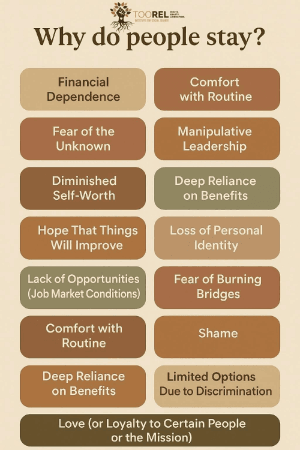Why do people stay?
Why do people stay?
Not in abusive relationships, but in toxic workplaces.

Are you asking the wrong questions?
We need to stop asking, “Why do people stay?” and “Why are you still there?”
But, since we’re still here, let me offer some honest insight into why people remain in toxic workplaces.
From the outside, it may seem simple: “If it’s that bad, just leave.”
But much like abusive relationships, toxic workplaces are fueled by fear, manipulation, and power systemic and control.
People don’t stay because they are unaware.
They often stay because of fear, economic survival, diminished self-worth, or deep emotional ties.
They don’t stay because they want to suffer, but because the structures around them make leaving feel risky—or even dangerous.
Toxic workplaces often chip away at confidence, isolate individuals, and use guilt, false hope, or performative progress to keep people silent and stuck.
Let me expand—here are 15 real reasons people stay in toxic work environments. My tribe and I have experienced many. This is not theory, this is real life.
Financial Dependence : Many people simply can’t afford to leave. Whether it’s paying rent or a mortgage, supporting children, or other financial obligations, the fear of losing a steady income often outweighs the emotional and psychological toll of staying in a harmful and toxic environment.
Fear of the Unknown: Even when a job is miserable, the uncertainty of unemployment or what comes next can be paralyzing. People worry that they won’t find another job quickly, or the next workplace might be just as bad…or even worse.
Diminished Self-Worth :Toxic environments can erode self-esteem and self-confidence. Exclusion, microaggressions, and constant criticism can lead individuals to question their abilities and worth—and even believe they won't succeed anywhere else.
Hope for Change: Some individuals hold on to the idea that things will get better with time: new leadership will change the culture, or that HR will finally intervene. Hope becomes their “life-preserving” anchor.
Limited Opportunities (Job Market Conditions): In a tough job market, or within specialized fields, options may be limited—especially for Black and Brown people who already face systemic barriers and injustices.
Comfort with Routine: Even harmful routines can feel safer than starting over. The emotional energy it takes to job search, interview, and onboard somewhere new can feel overwhelming.
Manipulative Leadership: Toxic leaders often use gaslighting, guilt-tripping, and false promises to keep people emotionally entangled. This psychological manipulation takes a toll on one’s spirit and soul.
Deep Reliance on Benefits: Employer-provided health insurance, retirement plans, dependent care support, or other critical can be lifelines. Losing these benefits may risk the well-being or health of family members.
Loss of Personal Identity: When work becomes deeply tied to your identity, leaving can feel like losing part of yourself or abandoning a community.
Fear of Burning Bridges: In tight-knit sectors (ex: the gender-based violence movement), fear of retaliation or damaged reputations and relationships can keep people silent, hoping to preserve future opportunities.
Fear of Homelessness or Instability: For many, without a safety net, living paycheck to paycheck, the reality is, even a toxic paycheck can feel like protection from disaster.
Shame: Some may feel ashamed for not being able to “tough it out” or believe leaving means they failed, creating emotional blocks to taking of the cape and walking away.
Guilt: Many people feel “duty-bound” to others and the communities they serve. They stay to avoid feeling like they’re letting someone, or their community, down.
Limited Options Due to Discrimination: Black and Brown people may already face racism and hiring bias. Past experiences with discriminatory practices and harm make them feel like they won’t be welcomed elsewhere.
Love (or Loyalty to Certain People or the Mission): Emotional ties to a team, mentor, or the work itself can make it difficult to leave, even when the environment is harmful and toxic.
So instead of asking, “Why do they stay?”
Let’s start asking the harder, more important questions:
Why are abusive behaviors protected, minimized, or excused—especially in organizations that exist to support survivors of violence?
Why is accountability seen as a threat rather than a pathway to inclusivity, trust, and care?
The real question isn’t why people stay.
The real question is: Why is the abuse allowed to persist?
Let’s be honest, many institutions weren’t built for all of us to thrive. They were shaped by policies and power structures that favored a select few, while positioning many —especially Black and Brown people—as doers, not thinkers. We are often expected to serve without the care, dignity, or support we need to flourish.
As leaders, not just by title, but by responsibility, if your organization is facing high turnover, disengagement, or burnout, avoidance is not the answer.
Ask yourself:
Who is thriving, and who is merely surviving?
What unspoken rules or norms are shaping the workplace culture—and who do they benefit?
Who is leaving—and why?
What systems and practices are being protected at the expense of people?
Who is carrying invisible labor (emotional support, DEI work, etc.) without acknowledgment or adequate compensation?
What can I do to create a healthy work enviroment where everyone can thrive?
If you're truly ready to create a more inclusive, equitable, and welcoming workplace—let’s talk. Schedule a free 30-minute consultation and let’s explore your first steps.
Contact information: info@toorelinstitute.org
- Arlene Vassell, Founding Director, TooREL Institute for Social Change